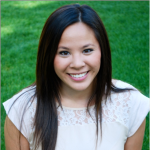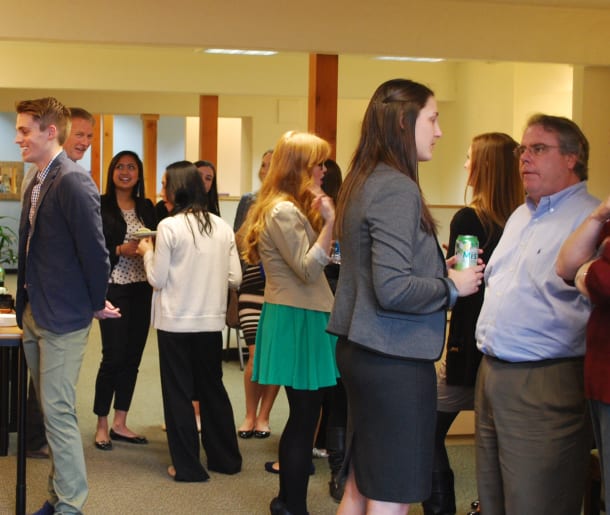Meet Ian Bragg, University of Oregon SOJC alumni, who will be joining us for our PRSSA Panel and Mixer tonight! Following his graduation with a B.S. in Journalism with a focus in public relations and advertising, Ian spent a few years at Waggener Edstrom. He then joined the Edelman team to work on their Xbox account. Currently, Ian is a Senior Account Executive on the Earned Media team at CMD. As part of the Portland PRSA chapter, Ian works as the Director of New Pros where he brings his five years of large agency experience to new PR pros.
We asked Ian some questions prior to the PRSSA Panel and Mixer. Get to know Ian before our event tonight:
Q: Did you have any internships while in college? If so, how influential do you think that experience was in helping you nail your first job?
A: I did not have any internships while I was in college. However, I was involved in a variety of activities, including the student-run magazine, Oregon Voice, Allen Hall Advertising (AHA) and of course, UO PRSSA. Honestly, I was very lucky to get a job out of college without holding any internships. I believe they are extremely valuable to prepare yourself before entering the job market. There are even some internship programs that require candidates have at least two previous internships and/or a Master’s degree. It’s pretty competitive out there, folks.
Q: What was the application process like for you when looking for post-graduation options?
A: My dad always taught me that “it’s not what you know, it’s who you know.” This couldn’t have been more accurate during my application process. A family friend introduced me to a VP at Waggener Edstrom, which led me to an informational interview, and well, the rest is history.
Beyond my personal story, I can’t stress enough how important setting up informational interviews is. Simply applying for a job is sometimes not enough. Plus, not all jobs coming down the pipeline are advertised on the company’s website. If you can demonstrate your value during an informational [interview], you’d be surprised how much that helps your chances at landing a job.
Q: What shocked you the most when starting your first job out of college?
A: The on-boarding process can be quite intense. I was lucky enough to start on the Microsoft account, so I had to learn all the ins and outs of the tech industry – right away. It’s exciting digging deep into the accounts you work on, but it’s mentally draining for the first few months. However, I wouldn’t give up that experience for anything in the world. Starting my first “real job” is one of the best feelings I’ve ever felt.
Q: What has been your favorite project or accomplishment?
A: I had the opportunity to launch Xbox One while I was working at Edelman. This experience was by far the highlight of my career. I worked harder than I ever worked leading up to the event, but it was worth every minute of it. I got to go to New York City to help with the launch, which included going backstage at Bloomberg, Fox Business and other broadcast publications with our top executive. I also ran the VIP/celebrity check-in and watched Macklemore perform for hundreds of Xbox fans attending the event. I was truly living the dream.
Q: How has PRSA benefited you as a professional?
A: As I mentioned above, it’s not what you know, but who you know. PRSA gave me the opportunity to meet and network with the leaders of the PR community in Portland. The PRSA New Pros specifically helped acquaint me with the numerous PR and marketing agencies in Portland. This knowledge helped me locate the most recent stage in my career – working on the Earned Media team at CMD.
Q: What are the top three skills PR students should try to obtain before graduation?
A: Writing/editing is probably the most important skill for a PR professional. Agencies and clients alike expect us to have strong writing skills and perfect grammar.
Social Media knowledge: As millennials, we are expected to have knowledge of emerging social media networks and how to leverage the existing ones. Today PR isn’t just about media relations, it encompasses all forms of communication.
Networking: It’s amazing how small the PR community is across the nation. By getting to know others in the industry, you will give yourself a leg up on the competition when job searching.
Q: What are some first steps students should take to build their networks?
A: Leverage your professors. They have more connections than you can imagine. Beyond that, join professional networks in the cities you are planning on working in. For example, PRSA New Pros and similar groups are a great way to get to know other young professionals and the various PR and marketing agencies in your community. And don’t be shy. Roll to a few meet-ups solo – chances are there are five other talented people in the room who are in the exact same boat. Finally, keep your LinkedIn updated and connect with the people you meet. LinkedIn is the number one way recruiters find candidates for jobs. You don’t want to miss out on that opportunity.
Be sure to stop by Allen 141 tonight at 6 to meet Ian Bragg and other professionals as they share their insight with us!
Lauren Todd, Internal Events Director, plans internal events for UO PRSSA in effort to build relationships within the group. In her spare time, Lauren enjoys assisting with weddings and staying up to date on the world of pop culture. Follow her on Twitter at @Lauren_Todd.






